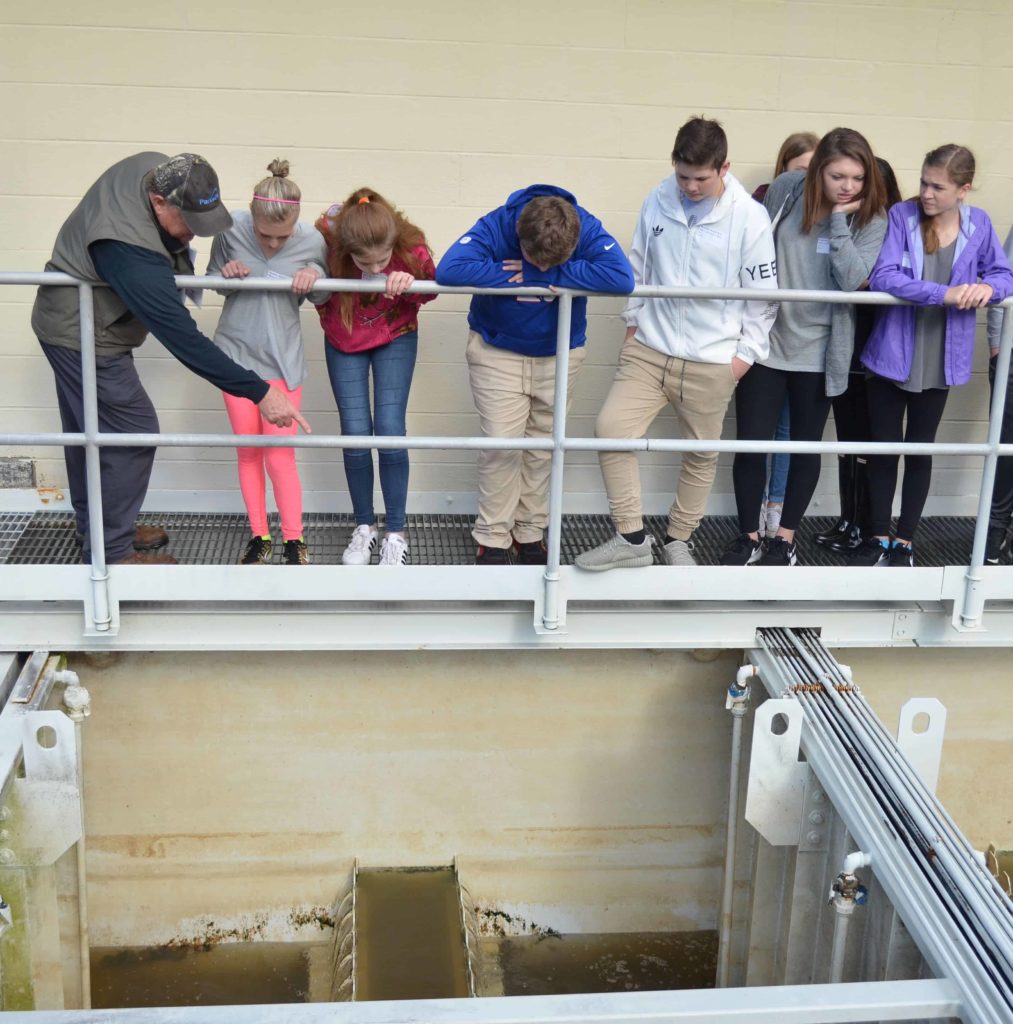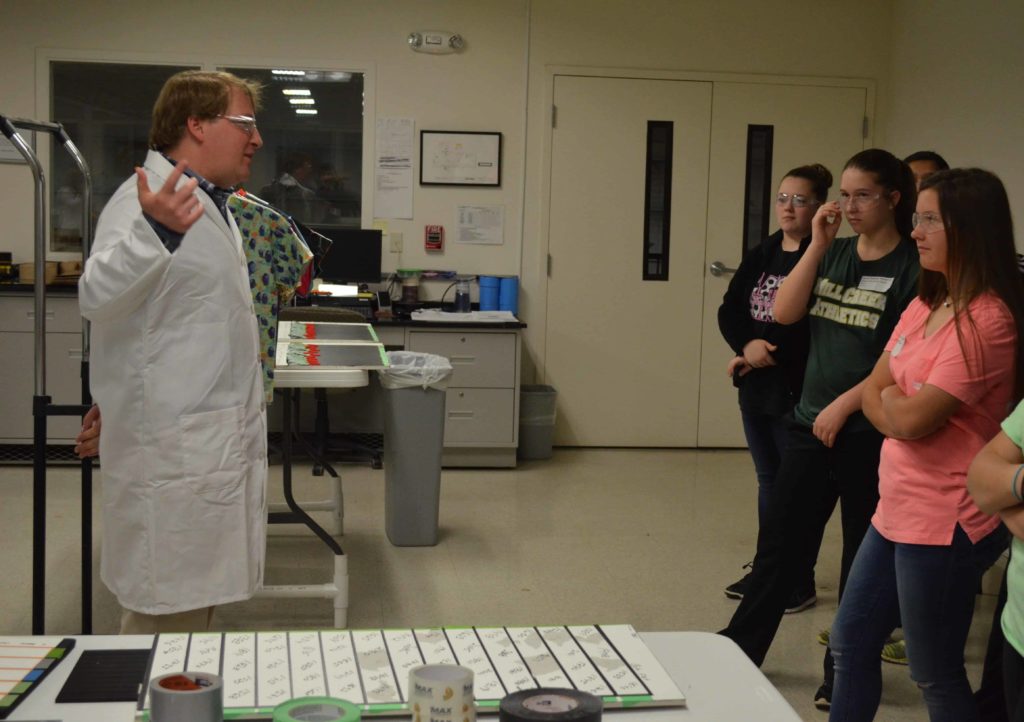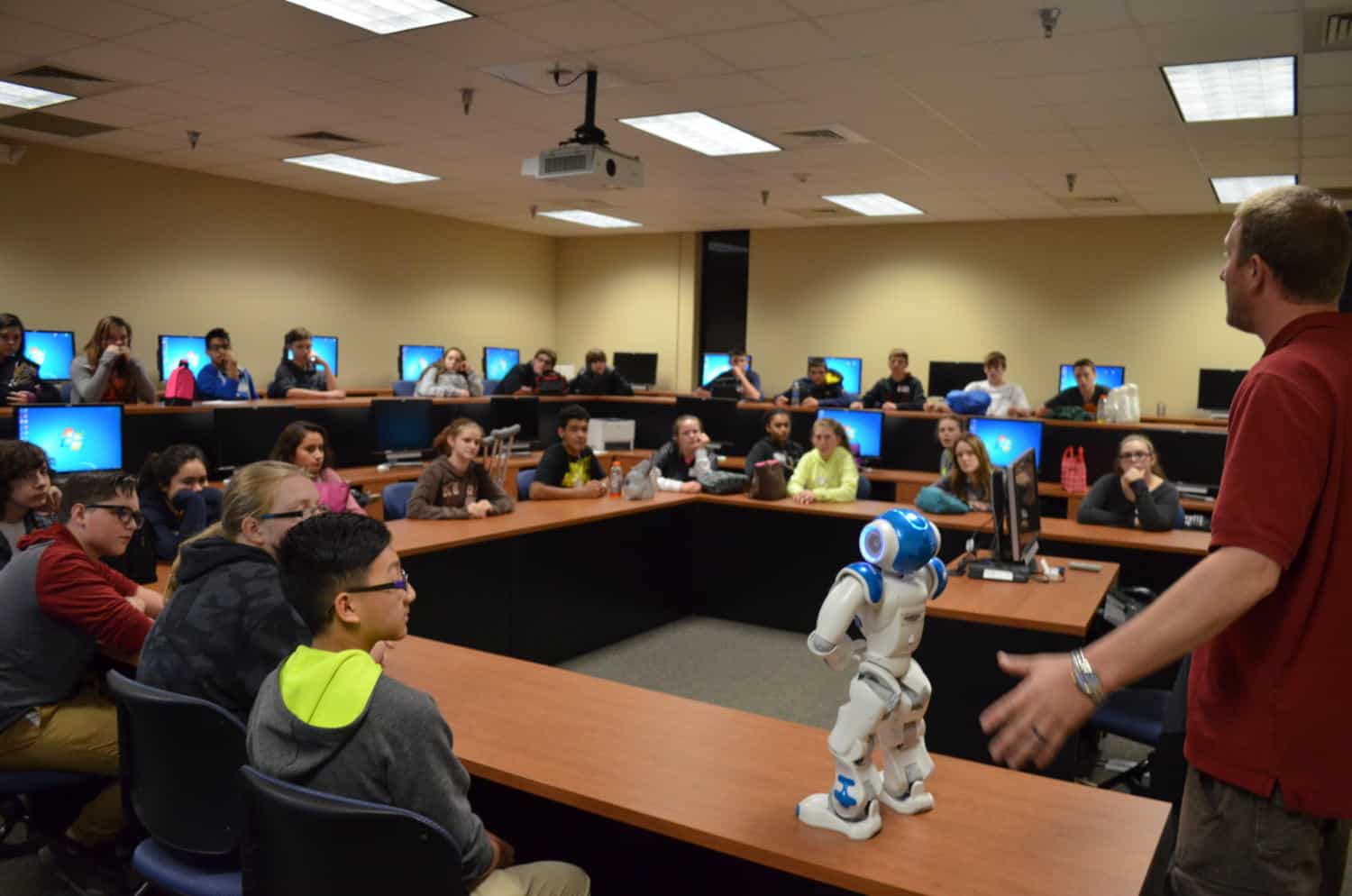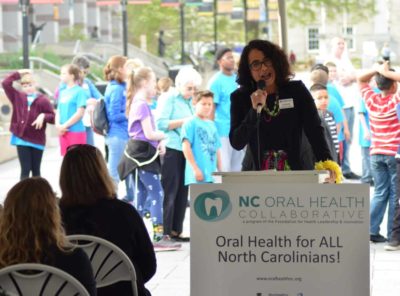One morning a few weeks ago, I drove through a neighborhood in search of Conover Waste Water Treatment Plant in Catawba County. The fact that I was in a residential neighborhood had nearly convinced me I was on the wrong track. But the GPS insisted I was going the right way. Many 8th graders from Mill Creek Middle School likely also thought they were lost that morning.
Finally, after passing a row of houses, the facility appeared, and Education Matters Extreme STEM tour started. It is a program designed to offer secondary school students exposure to career paths in science, technology, engineering and math (STEM).
A few minutes after arriving, I was packed into a room with a group of skeptical 8th graders and Evan Reubins. He is a jack-of-all trades at the plant; he conducts compliance testing, lab testing, and, in his words, “just about anything else that comes up.”
“A lot of times kids say this is pretty nasty, it’s pretty gross out here,” he said. “But we bring them in here to the lab and I run some tests. I take some of our equipment and set them up and show them how the lab equipment works.”
Why?
“It’s a little public relations,” he said. “Show them that every time they flush the toilet it doesn’t just disappear. It goes somewhere and it has to be dealt with.”
This is the sixth year of the Extreme STEM Tour which began when Catawba County Schools received a grant from the Golden LEAF Foundation to, among other things, improve science education in the system. One of the requirements of the grant was that students in the school system get more exposure to STEM careers.
Tracy Hall, director of Education Matters in Catawba County, was approached about fulfilling the latter part of the grant. She did not think it would be very interesting to just bring in people from STEM careers to meet kids in school. She thought she had a better idea.
“I said, well, I feel like it would be a much better experience for kids to be able to go into business and industry,” she said, adding later. “I knew if I could get one business to say yes, that would start the trend of the others.”
The one business was Von Drehle Corporation, a towel and tissue products supplier. Hall leveraged their participation to get other local businesses involved.
“When I would talk to other companies, they would say, ‘I’m not sure about this,’” she said.
She told the companies that all these 8th graders were going to grow up wanting to work for Von Drehle. Soon, other businesses joined in the program.
Today, more than 55 businesses take part. And the Extreme STEM Tour just hit a milestone: taking 10,000 8th graders to visit local businesses that employ people in STEM careers.
While Catawba County Schools received the Golden LEAF Foundation grant, two other school districts in the area—Hickory Public Schools and Newton-Conover City Schools — wanted in on the program, too. Their students take Extreme STEM Tours in the fall.
The day I took part in the tour, 8th graders boarded the bus from Mill Creek to travel around to businesses all over Catawba County. The concept is simple. Each kid visits at least two businesses, where they will spend an hour at each location.
Following that, students got the opportunity to go to the Catawba Valley Community College and the North Carolina Center for Engineering Technologies. If the business locations showed the kids what career opportunities awaited them in Catawba County, the college and Center showed them how to get there.
“For kids who may not have the resources to go away to school, they can get a four-year degree in engineering here,” Hall said. “So we want them to know that.”
In addition, the 8th graders are currently selecting their classes for high school, and if they start to get a sense on one of the tours about a field of interest, the schools can help them pick the right high school classes to start them on the path to getting there.
At the waste water treatment plant, students got a full tour of the facility, including a primer on how the plant goes about cleaning the water that residents use for everything they do.
Jeanine Lynch, a secondary math curriculum specialist for Catawba County Schools, was one of the chaperones at the waste water treatment plant. She said the tours are important because the area is losing its workforce.
“A lot of our kids don’t realize the job opportunities and businesses that are in this locale,” she said.
She said the Extreme STEM Tour can show the kids that they have opportunities in Catawba County. They do not have to leave to be successful. Some students who have participated in the tours over the years have actually gone back and worked or apprenticed at one of the businesses they have visited, she said.
That is good for both the students and the businesses, and Hall says the reaction from the companies that participate has been positive.
“The enthusiasm from our business community has just been off the charts,” she said.


After leaving the waste water treatment plant, the tour went to Shurtape, a local company that specializes in manufacturing things like duct tape. The students were fascinated, asking in a group session at the end of the tour whether employees with the company get employee discounts or access to free tape supplies. (They don’t).
Over the course of the tour, they learned that Shurtape has everything from entry to high-level jobs that encompass all steps of the education ladder.
In a presentation, staff from the company laid out for the students some of the different jobs and what educational tracks would lead to those jobs.
Bill Green, a business manager in the HR department at Shurtape, said the company gets a lot out of showing the kids around.
“Number one it’s to educate our folks in the community,” he said. “We found that there are a lot of kids, as they get towards graduating high school, may not want to go up to the next level.”
And at Shurtape, manufacturing jobs that don’t require a college education are alive and well.


After Shurtape, some of the students went to the NC Center for Engineering Technologies. There they learned a little about the facility. They also got to see a demonstration of a humanoid robot, albeit one that was experiencing some technical difficulties. One of the demonstrations was mostly successful and impressive.
Another was just funny.
Either way, the kids loved it.
Jamie Hill, an instructor in the Engineering Technologies department at the community college, led the demonstration. He said the idea behind bringing kids to the Center or the community college is to spark their interest in STEM.
“You’re hoping that in a few years, they remember something that you’ve shown them,” he said.
It is hard to tell what will impact a student. When they conclude the tours, they go back to the schools and talk about what they saw and learned. Many of them find out about businesses in their community that they may have driven past with no clue what was happening inside.
“Well, it’s been kind of cool seeing all the robots and stuff and being able to touch things,” 14-year-old Mia Bennett said. “And it’s pretty cool seeing how much Catawba does.”
For others, the trip reinforces their already-established interests. Thirteen-year-old Alexa Klabo wants to be a neonatal nurse, and she was excited to go to the community college and see the simulated hospital —which is the largest this side of the Mississippi River according to Hall.
Hall said she knows the program is grabbing the interest of students. She told a story of one young man who went on one of the Extreme STEM Tour trips. He came up to her afterwards and started talking to her.
“He said, ‘I had no idea what this was going to be about. This has been the greatest day,’” she said.



